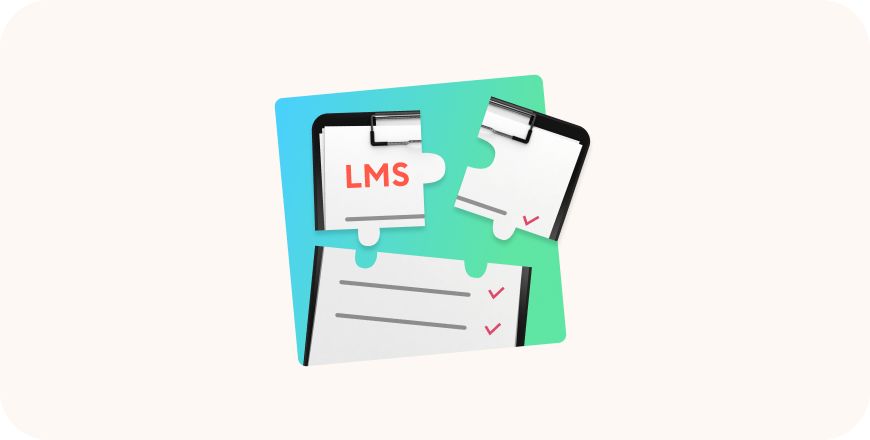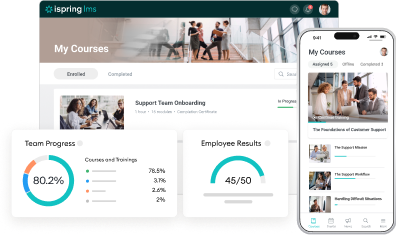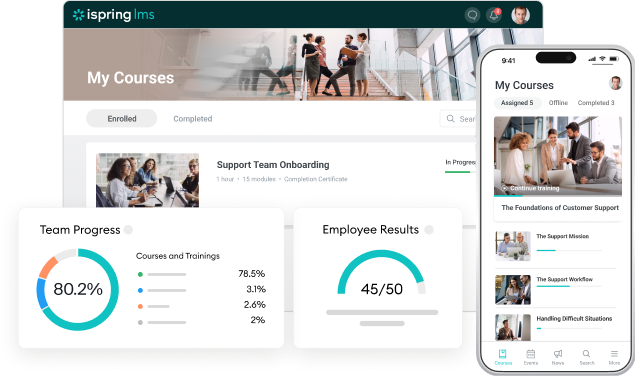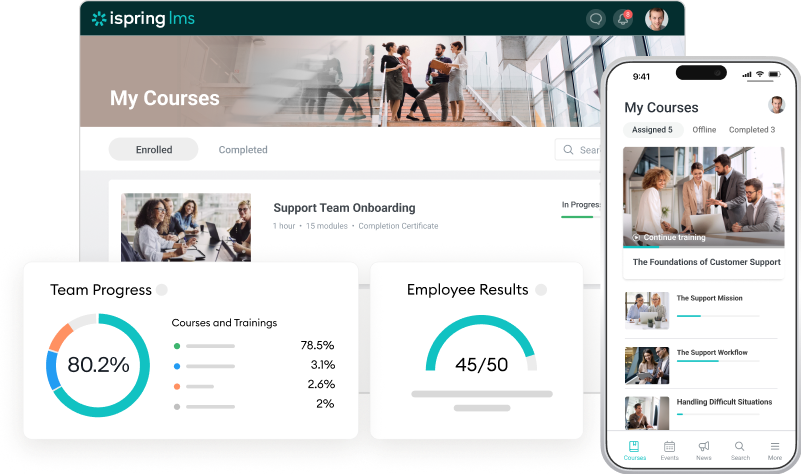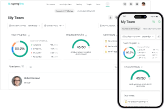The 9 Best Healthcare LMS Software: Top Picks and Reviews

Continuous training in the medical sector is nothing short of vital. Medical workers need to keep up with the latest knowledge in their fields and stay compliant with numerous regulations to provide quality care for patients.
Whether it’s ticking regulatory boxes or boosting staff skills, the right healthcare learning management system (LMS) sets you up for success. And if you’re looking for the best LMS for healthcare training, take a closer look at our healthcare learning management system vendors comparison.
What Is a Healthcare Learning Management System?
A healthcare learning management system is a software platform designed to manage and deliver training in healthcare settings. It helps organizations provide staff with the necessary knowledge and skills that will ensure they remain current with medical updates, safety practices, and industry standards.
With a healthcare LMS, medical organizations can streamline employee onboarding, enhance training program efficiency, facilitate ongoing education, and make sure that their healthcare professionals meet regulatory requirements, all while reducing manual tracking and administrative overhead.
11 Must-Have LMS Features for the Healthcare Industry
Healthcare LMS platforms are designed to address the specific needs of the healthcare industry, and as such, they should offer a variety of features that support the delivery of effective and well-planned training programs:
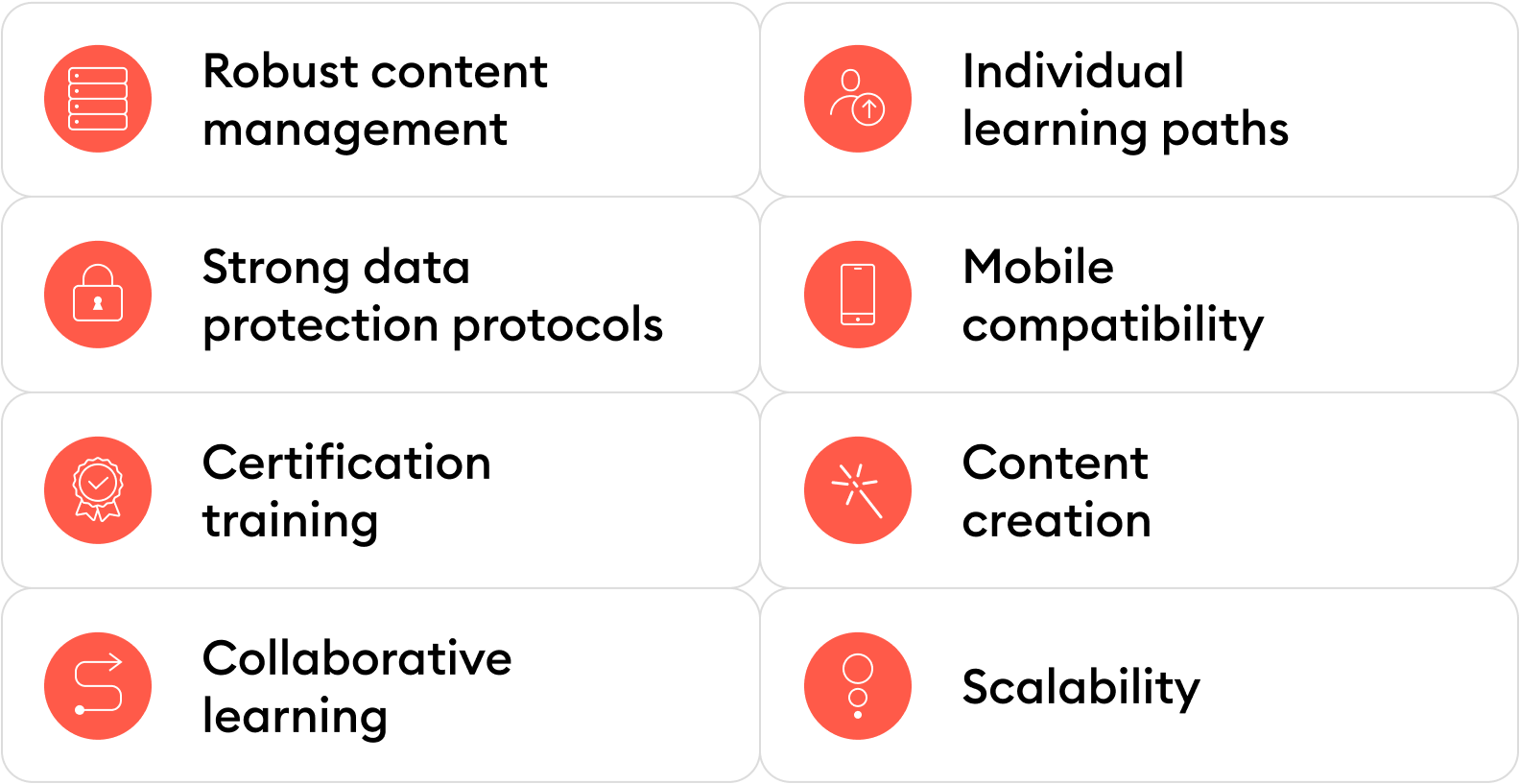
Essential features of a healthcare learning management system
Content creation and management
eLearning content management is one of the key capabilities of a healthcare learning management system. The best systems also provide built-in learning tools for quickly authoring content (like page-style articles or guidelines, role-playing sims, and tests), making it easy to develop and distribute training materials for continuous learning. This reduces reliance on third-party tools and ensures that healthcare professionals always have access to the most up-to-date information.
Knowledge assessment
Regular assessments help organizations make sure that healthcare professionals are grasping key concepts and complying with essential standards of patient care. Employees in turn have a chance to retain knowledge better with regular quizzes. Note whether an LMS for the healthcare industry allows you to create knowledge checks right on the platform.
Certification training
With a certification training program, healthcare organizations can stay on top of mandatory training. This includes issuing completion certificates, tracking expiration dates, and keeping certifications up to date.
These learning management system features help maintain legal compliance while also building trust with patients and stakeholders, as it demonstrates that medical staff are properly trained and current with their certifications.
Strong data protection protocols
Healthcare LMS platforms should come with stringent data security measures to protect sensitive information, such as patient data or employee records. These protocols, including encryption and user authentication, ensure compliance with privacy laws like HIPAA during employee training.
L&D reporting and analytics
When training employees online, prioritize real-time statistics as it’s essential for identifying knowledge gaps and assessing the effectiveness of your courses. Training administrators can track metrics such as learner completion rates, quiz scores, time spent on courses, attendance on live training seminars, and overall engagement with training materials.
Additionally, it helps healthcare organizations ensure that student groups are consistently up to date with required certifications and patient care standards, providing transparency and accountability in training progress.
Individual learning paths
If a healthcare learning management system features learning tracks, this means you can create personalized healthcare training programs for individuals, groups of healthcare professionals (depending on the job title), and departments. For example, you can create sequential onboarding experiences combining all essential courses into an induction track, or create role-based training programs to achieve specific learning objectives.
These tailored, role-based training paths help focus on the relevant skills and knowledge each staff member needs, ensuring that staff receive training that directly supports their job.
Mobile learning
Mobile compatibility of healthcare learning management systems ensures that medical workers can access training materials on smartphones or tablets, allowing them to learn from anywhere, anytime. This is especially important in healthcare environments where staff often work irregular hours, are often on the go, or when there’s a need to revise theoretical aspects during hands-on training.
According to numerous iSpring case studies, such eLearning flexibility helps trainers achieve higher employee engagement, knowledge retention, and course completion rates.
Also read: iSpring healthcare clients’ success stories
Integration with an existing ecosystem
For better workflows, a healthcare LMS should work smoothly with other systems you use, like HR software or electronic health records (EHR). This makes all training data, employee records, and performance metrics connected, saves time, and ensures that the information is always accurate.
Collaborative learning
Tools like forums, messaging, or shared workspaces within learning management systems help create a collaborative learning environment, which means more connections, better knowledge sharing among student groups, and relationship building.
In healthcare, team members can collaborate on patient care scenarios, discuss best practices during hands-on training, and learn from each other’s experiences.
Knowledge base
This is a centralized hub of resources within a learning management system that includes articles, FAQs, guidelines, and case studies. With a knowledge base, healthcare professionals can access helpful instructions whenever they need additional support, want quick answers to their questions, or want to brush up on specific topics.
Scalability
Scalability ensures that an LMS can grow as the healthcare organization expands by adding more student groups, courses, and departments, or requiring more advanced functionality for future learning opportunities.
The Top 9 Healthcare LMSs
We’ve reviewed dozens of healthcare LMSs and selected 9 that can ensure compliance to requirements and will help you organize healthcare training online. Click on any of the learning management systems below to learn more or scroll down for a full review:
| Healthcare LMS systems | Main features |
| iSpring LMS |
|
| Docebo |
|
| Tovuti |
|
| TOPYX |
|
| Totara |
|
| EthosCE |
|
| Litmos |
|
| HealthStream |
|
| Relias |
|
1. iSpring LMS
iSpring LMS ranks first on our list as the best LMS for the healthcare industry. Despite the minimalist, highly intuitive design, it provides rich capabilities for continuous learning and training tracking, as well as guaranteeing airtight data security.
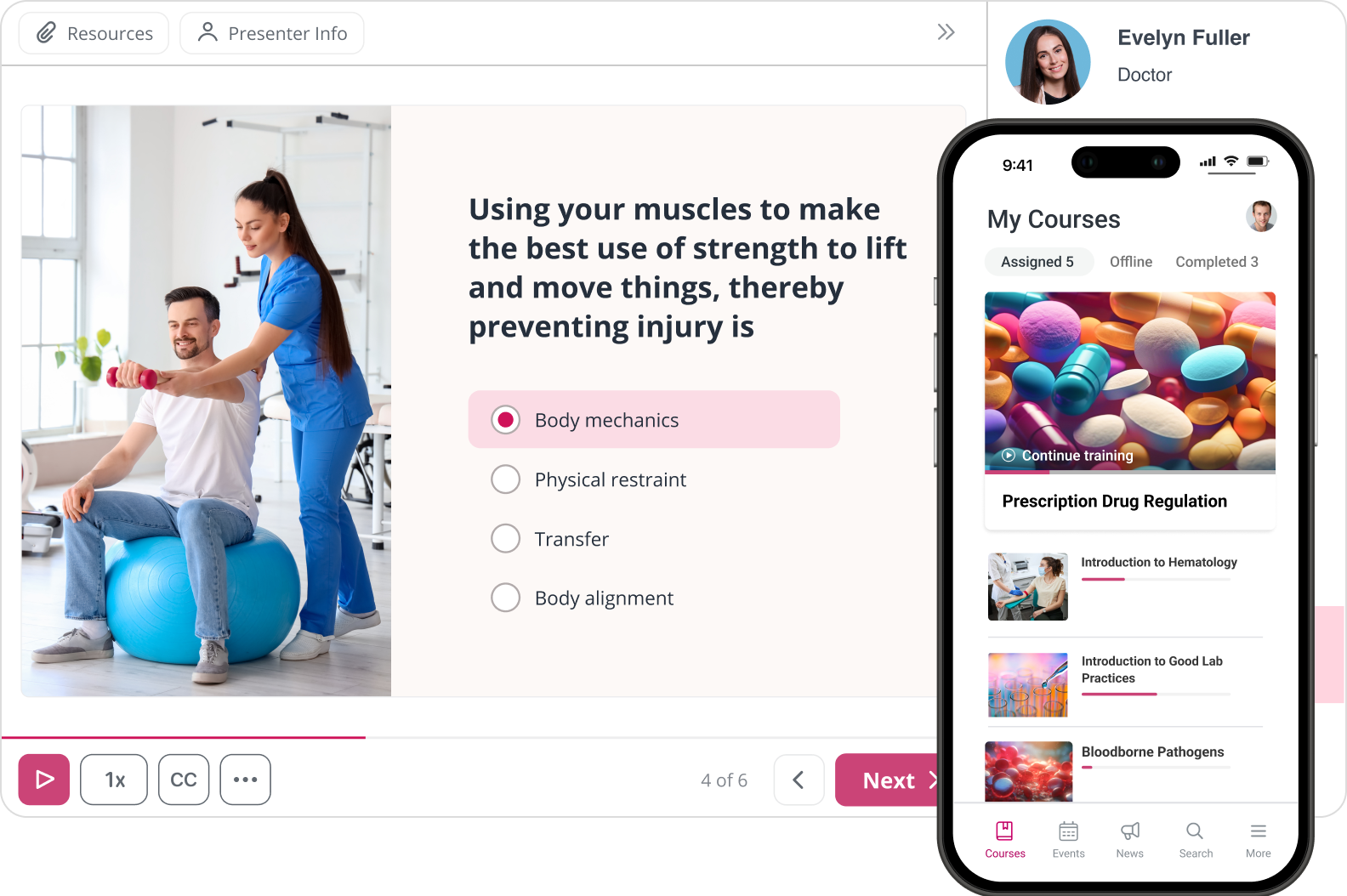
You can deliver online healthcare training as standalone courses or combine them into sequential learning tracks, which allows healthcare organizations to create customized training journeys according to job title or department.
Smart training automation literally puts training on autopilot: once you define the rules, iSpring LMS handles regular assignments, automatic learner reminders, notifications, and deadline reminders. Detailed, real-time reports and a crystal-clear supervisor dashboard help you keep track of training progress within an organization, so you can spot any skill gaps quickly and address them promptly.
Also read: The Best LMS Reports to Ensure Your Training Success
This LMS for the healthcare industry also stands out with a native mobile app, an advanced knowledge base, an on-the-job training module, and great content creation capabilities that allow you to cater to various learning styles by creating cheat-proof assessments, training videos, and even role-playing simulation training that helps simulate workplace scenarios and train problem-solving skills.
Users appreciate this healthcare LMS for its responsive customer support, a wealth of how-to videos and learning resources, as well as a very intuitive UI that makes navigating the platform easy for both learners and administrators.
Pros
- Simple, easy-to-navigate interface
- On-the-job training module
- AI-powered course authoring capabilities
- 25+ real-time training reports
- Gamification (points, badges, leaderboards)
- Native mobile app (iOS and Android)
- Plenty of useful integrations (video-conferencing tools, analytics, CSM, HRIS, proctoring software, and more)
- 24/7 live technical support via phone, chat, and email
Cons
- No multi-tenancy support
- No free plan or discounts for healthcare organizations
Pricing
The cost depends on the number of active users:
- 300 users — $4.46/user/month
- 500 users — $3.97/user/month
- 1000 users — $3.58/user/month
Billed annually. There are also custom quotes for different numbers of users.
Get a free 30-day trial of iSpring LMS
2. Docebo
Docebo is one of the best LMSs systems for healthcare as it helps organizations enhance product training methods, compliance, and employee development.
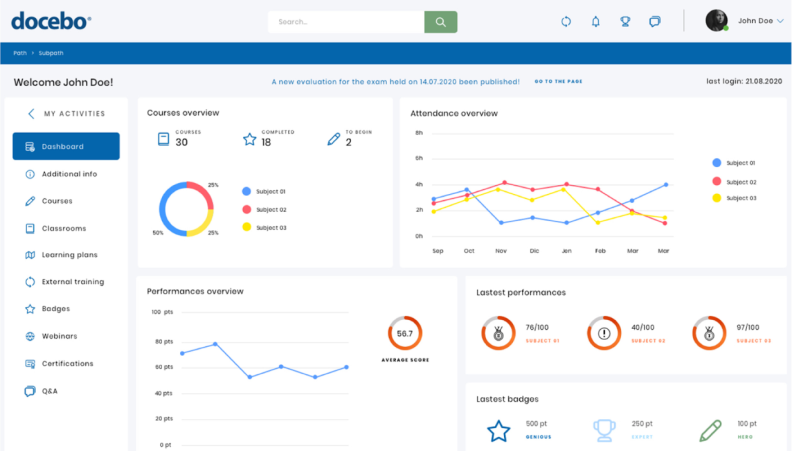
This learning management system excels in certification management as it automates the issuance of certifications and keeps track of expiry dates. To lighten the training burden, administrators can set up automated reminders and notifications for certification renewals, which reduces the risk of missed deadlines.
This healthcare learning system also provides strong reporting and analytics tools that track learner progress and training effectiveness. With its native mobile app, healthcare professionals can access courses anytime, even while on the go, which is crucial for busy medical staff.
Some other valuable healthcare features include instructor-led training support, an AI-powered course creation tool, collaborative learning, and AI-personalized course recommendations.
Users appreciate this LMS for healthcare providers for its customization capabilities and quick and helpful tech support.
Pros
- 400+ integrations, including content authoring tools, HRIS, SSO, SRM, and messaging platform
- SSO and two-factor authentication
- 30,000+ off-the-shelf courses for an additional fee
- Instructor-led training support (for coaching sessions or blended learning)
Cons
- A somewhat complicated user interface
- No free trial
- Some features are only available in Elevate and Enterprise plans
Pricing
Three subscription plans are available:
- Engage starts at $25,000/year.
- Elevate starts at $40,000/year.
- Enterprise is custom.
3. Tovuti
Tovuti is a learning management system that makes online training for healthcare manageable, trackable, and transparent. Thanks to fast implementation, healthcare organizations can set up the platform and start their learning programs within days.
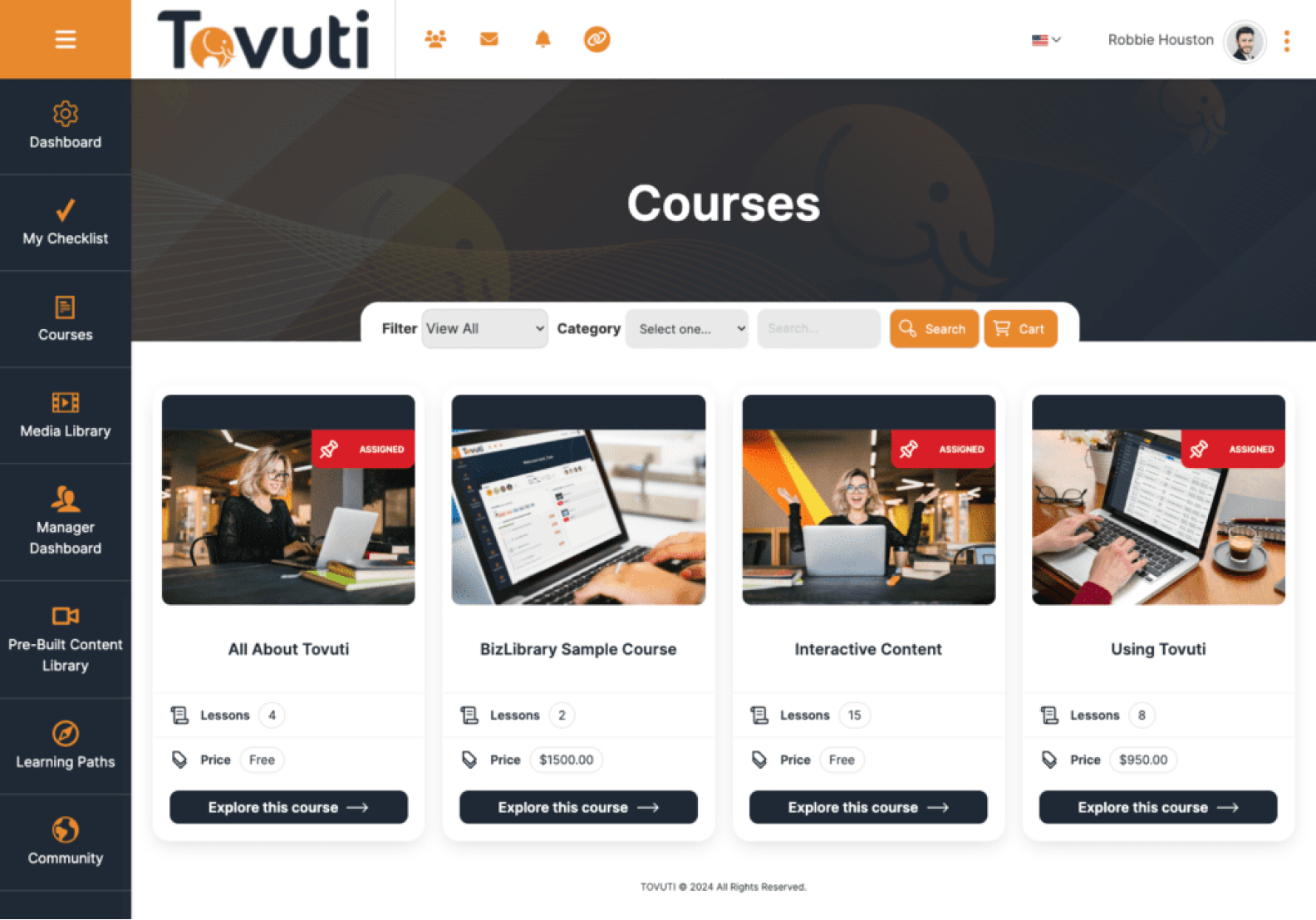
This healthcare learning system features over 30,000 pre-built courses, providing instant access to high-quality content, which is especially valuable for continuous professional development. The LMS for hospitals also supports customizable learning tracks and tailored checklists, allowing healthcare organizations to design online healthcare learning experiences that address the unique needs of their healthcare teams.
Tovuti automates enrollments, reminders about learning sessions, and certification management, ensuring that staff are always up-to-date with their training and compliance requirements. The LMS also provides granular data insights that help a training instructor track healthcare compliance training online, identify and bolster skills or knowledge gaps, improve training effectiveness, and gauge employee satisfaction to reduce churn.
Tovuti’s intuitive interface and 2,000+ integrations make it easy to connect with existing tools, creating a seamless experience for both administrators and learners.
Users highlight the platform’s ease of use and course creation capabilities.
Pros
- Integrates with most HRIS systems
- Highly secure LMS
- White labeling
- Interactive, gamified employee learning experiences
Cons
- Slow tech support according to client reviews
- The customization process is somewhat complicated
Pricing
Upon request.
4. TOPYX
TOPYX is a medical learning education platform that’s a good match for both large and small healthcare organizations looking for learning software.
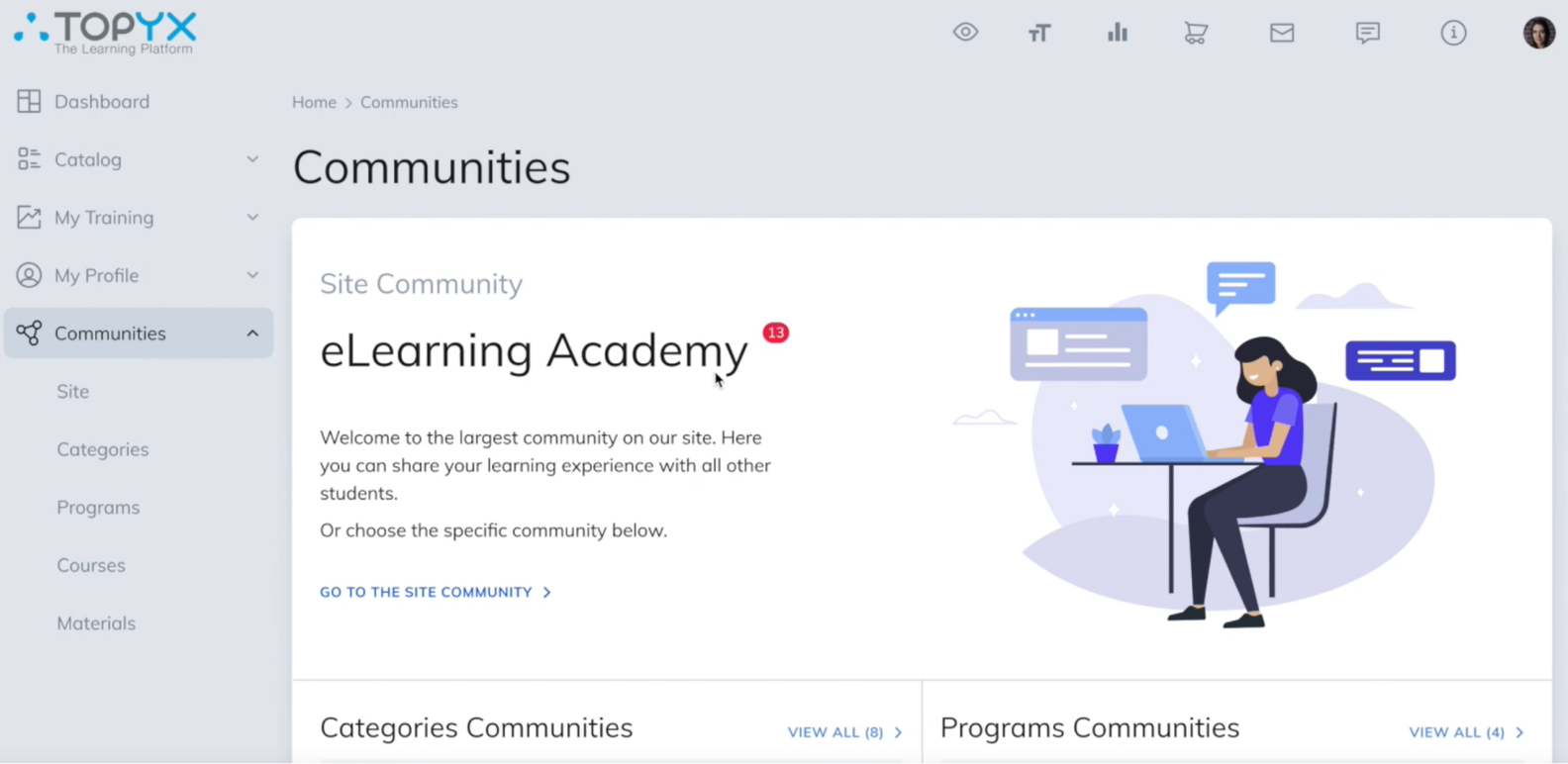
TOPYX has a strong focus on creating a collaborative learning environment: it features chats, forums, and media galleries for learners. Trainees can easily communicate, collaborate, and exchange knowledge on a single platform. Certifying your medical teams is also a simple and straightforward process with TOPYX, thanks to smart reports.
This hospital learning management system supports mobile learning to provide trainees with flexibility and support self-paced learning experiences. You can also enjoy a number of add-ons, including HIPAA and HITECH compliance. It means this hospital LMS securely handles and protects sensitive medical data in accordance with regulatory requirements.
The TOPYX learning management system also has a ready-made course catalog in case you need to launch online healthcare training quickly and don’t have time to create your own content. However, if you create eLearning materials for your medical teams in-house, you’ll have to look for a third-party authoring tool since TOPYX medical learning platform doesn’t support content creation.
The reviews of TOPYX as an LMS for the healthcare industry rate the value for money, as well as the intuitive approach and good customer service.
Pros
- Focus on social learning
- Catalog of ready-made courses
- Learning paths for role-based training
- SCORM compliant
- Customizable certificates
Cons
- No course authoring capabilities
- Limited built-in interactivity
Pricing
Upon request.
5. Totara
Totara is a talent development tool that healthcare organizations can use as a medical education platform.
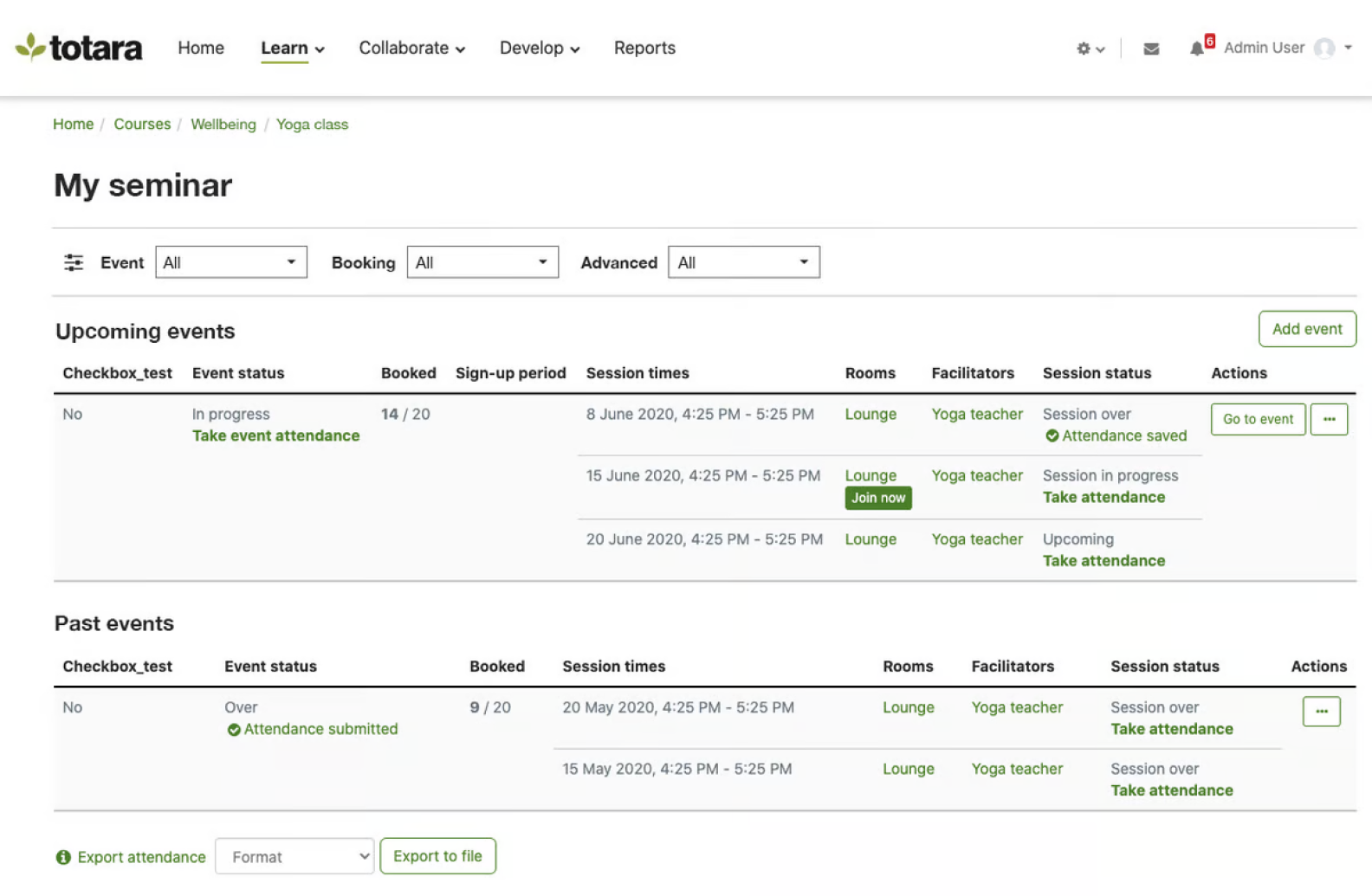
Totara is compliant with OSHA, HIPAA, and other obligatory regulations. This makes the platform a reliable healthcare compliance LMS with which organizations can maintain legal and ethical standards while providing employee education.
The tool is also readily scalable. You can deliver specialized medical training to an extended network of hospitals, institutions, and medical professionals as your organization grows. People and teams outside the organization can also be invited to take training.
The Totara learning platform integrates with many solutions, including web conferencing tools, eCommerce platforms, and learning tools, so you can customize the LMS to your organization’s learning objectives. While there is no way to use Totara to build eLearning content, it provides a marketplace of off-the-shelf courses that you can browse and choose from.
Reviewers of Totara are happy with how customizable the platform is, as well as the usability of the reporting tool as part of a medical learning platform, which is an essential part of healthcare compliance lms platforms.
Pros
- Mobile learning
- LXP functionality
- Compliant with OSHA and HIPAA
- Supports single sign-on
- Reminds learners of deadlines
- Has integrations with other software
Cons
- No course authoring capabilities
- Unresponsive mobile app
- Complex interface
Pricing
Upon request.
6. EthosCE
EthosCE is an online medical learning platform that specifically caters to medical professionals and healthcare organizations, including universities and medical education companies.
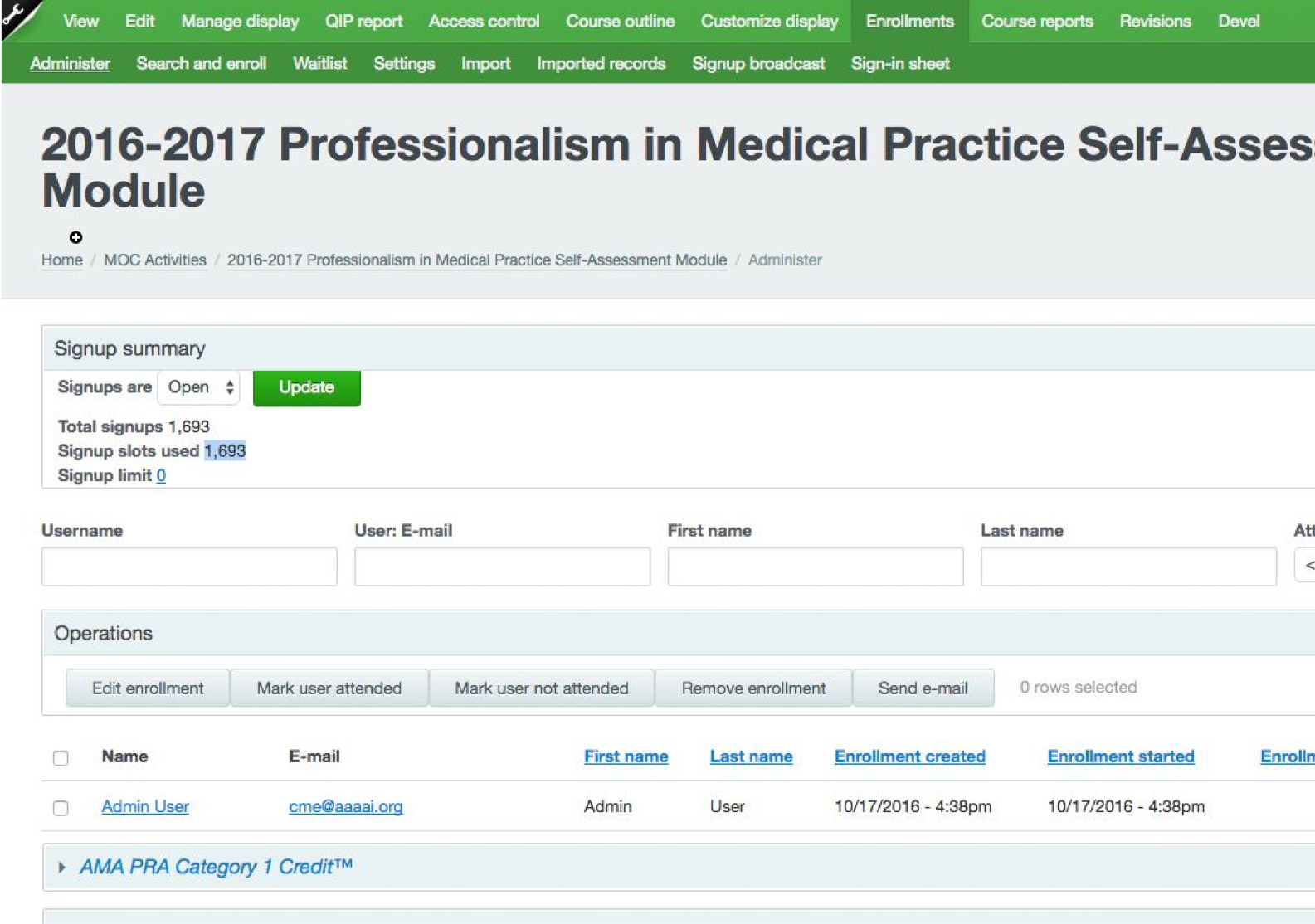
This training platform excels in providing accredited continuing education for healthcare professionals. Its top features include white labeling, automated certificate generation, and comprehensive reporting tools.
If you already have online healthcare training courses on your medical education platform, you can easily integrate those into the LMS and launch online training right away. EthosCE also features built-in assessment tools with different question types, automated response feedback, and follow-up assessments.
Additionally, this healthcare learning platform can create certificates for staff based on their results, including CME, CNE, and CEU for nurses and medical professionals.
At its core, it’s an LMS for the healthcare industry. But with custom branding and integration with Shopping Cart, you can sell courses to third parties.
Reviews are positive, praising the intuitive interface and support for this healthcare training platform.
Pros
- Geared toward medical professionals
- Generates CE certificates that showcase CEU, CNE, and CME credits
- SCORM compliant
- eCommerce features
Cons
- No authoring capabilities
- Not mobile friendly
Pricing
Upon request.
7. Litmos
Litmos is a popular enterprise LMS for online training with a rich feature set. The platform is easy to use and has a clear interface. It’s a highly scalable solution, so it will be a good match for growing healthcare organizations.
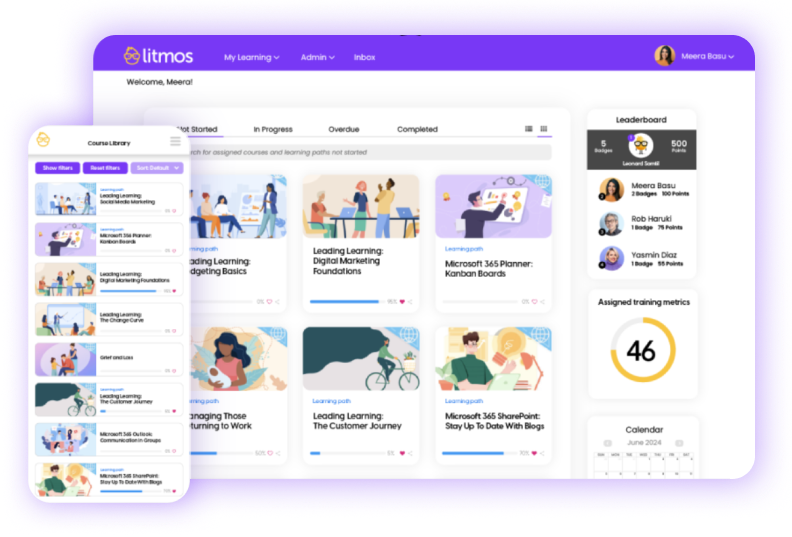
The Litmos learning management system has built-in authoring capabilities, which means you can create training materials in-house. Additionally, the platform comes with an entire library of courses. These include HIPAA accreditations, privacy, health and well-being, and other content that’s relevant to the healthcare workforce. Moreover, Litmos makes it easy for organizations to enforce the latest compliance training requirements.
The Litmos healthcare learning platform implements gamification mechanics in the form of points, badges, and leaderboards. This helps increase trainee engagement and motivation. The LMS also offers a sleek app on Android and iOS, so users can learn while on the go.
Reviews of Litmos generally praise its intuitive design and flexibility.
Pros
- Intuitive interface
- Library of ready-made courses
- Integrations with Zoom, BambooHR, Skillsoft, Go1, WorkDay, and open API
- Great platform for large enterprises
- Native mobile app (iOS and Android)
Cons
- Some important features (content authoring, custom branding and gamification) aren’t available for the Litmos Foundation Suite plan
- Limited customizability for user roles
Pricing
The Litmos healthcare learning management system offers three pricing plans. You’ll need to contact the vendor’s sales reps to get quotes.
8. HealthStream
HealthStream is another medical training platform for continuous learning and effective training management in healthcare organizations.
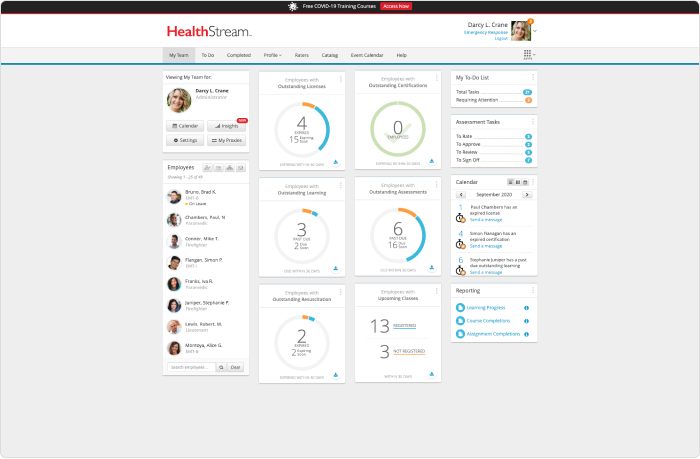
As the LMS specializes in providing training tailored to the unique needs of healthcare organizations, it has a range of industry-specific capabilities. These include online healthcare compliance training modules, credential management, and performance appraisal tools.
HealthStream features a large healthcare course library where you can access medical product training modules, industry-sponsored CE/CME courses, and several board-accredited and ANCC-accredited continuing education courses.
HealthStream also comes with a collection of ready-made assets and a content authoring solution to help a training instructor build their learning content.
Reviewers appreciate the platform for its extensive employee learning library and the responsive customer service that helps resolve issues when training employees online.
Pros
- Course authoring capabilities
- Catalog of ready-made healthcare courses
- Learning paths for role-based training
- Credential management
- Medical compliance training
Cons
- Unintuitive interface
Pricing
Upon request.
9. Relias
Relias is a centralized LMS for medical education that promotes blended learning.
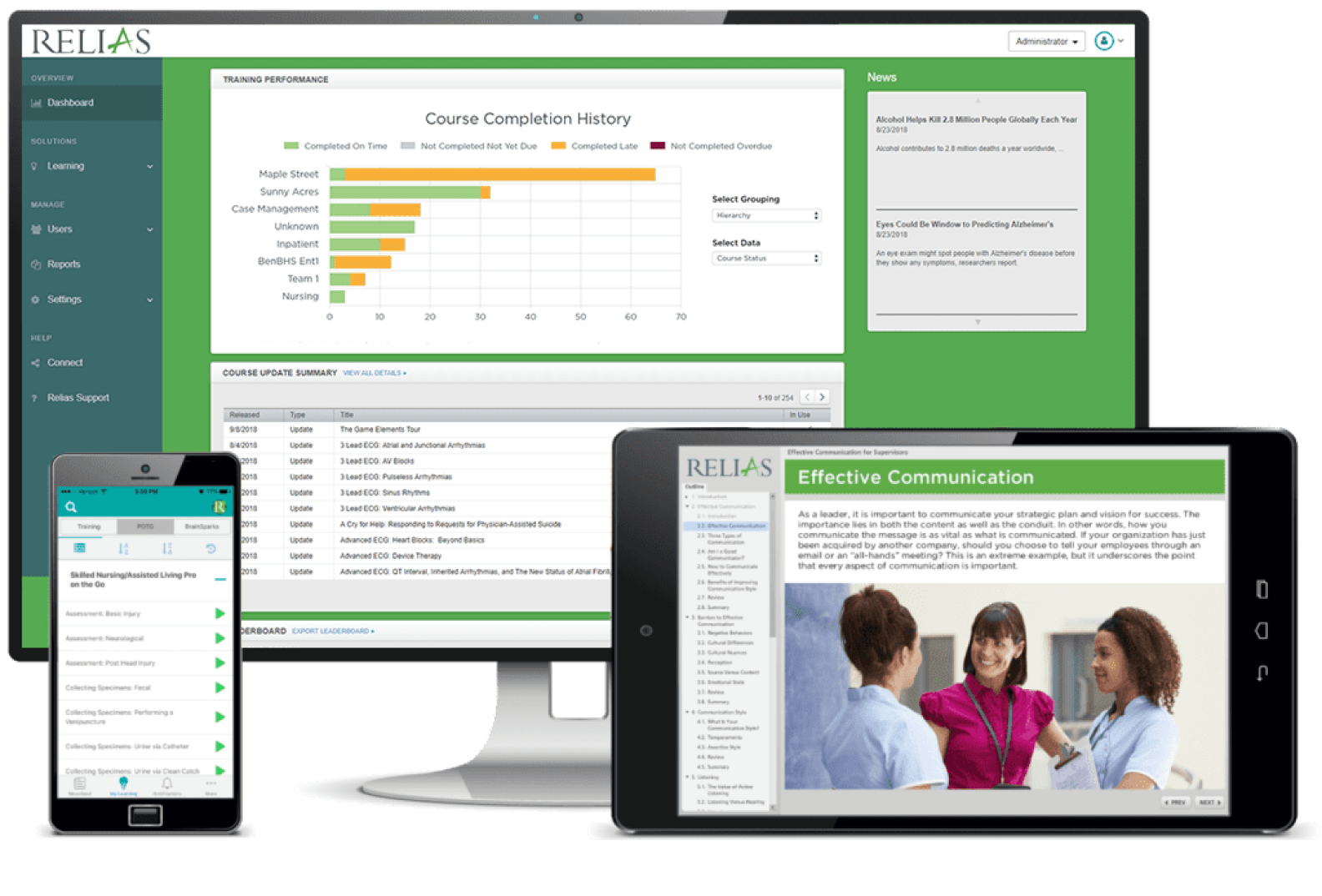
The platform includes features such as customizable learning paths, automated reminders, and robust reporting and analytics tools for managing and tracking healthcare training programs. It also streamlines policy and procedure management.
Like other LMS platforms geared toward medical organizations, this healthcare training platform has a collection of off-the-shelf courses curated by medical experts. They include custom courses created by the LMS’s users.
Relias’s interface is designed to be intuitive, with features that cater to both beginners and experienced users. While there may be a slight learning curve for users who are new to the platform, Relias provides comprehensive training and support resources to help users get up to speed quickly.
Users report that this healthcare learning management system simplifies medical compliance training and trainee enrollment.
Pros
- Extensive course library
- SCORM-compliant learning management system
- Learning paths
- Friendly support
- Instructor-led training support
- Medical compliance training
Cons
- No course authoring capabilities
- Poor performance on mobile devices
Pricing
Upon request.
How to Choose the Right Medical Learning Management Software
If you’re in the process of selecting a learning management system for healthcare employee training, consider the following factors:
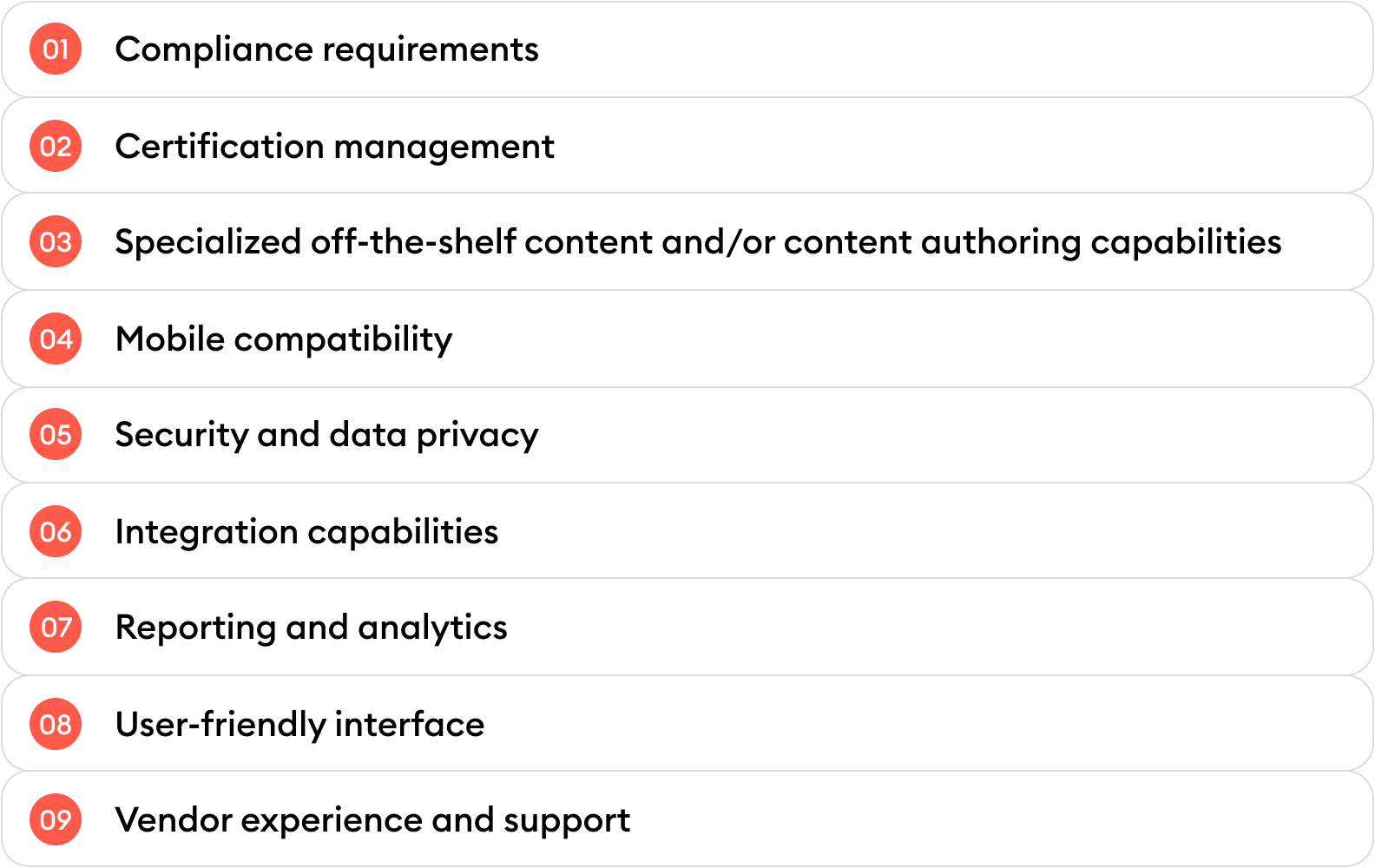
Things to consider when selecting healthcare learning management systems
Compliance requirements
Can the healthcare learning system provide compliance training modules tailored to healthcare regulations? You should be able to deliver compliance training quickly and easily and track employee compliance performance via the learning management system.
Certification management
When training employees online, look for features that allow the issuing and managing of staff certifications and education credits. Healthcare LMSs systems should allow administrators to generate certificates automatically upon course completion and provide an efficient way to monitor and report on the status of certifications. This helps to ensure that no certifications are missed and that healthcare professionals remain current with mandatory qualifications.
Specialized off-the-shelf content and/or content authoring capabilities
Check the availability of industry-specific training content relevant to healthcare professionals for broader learning opportunities. If your team prefers to create courses on patient care in-house, opt for a learning management system for healthcare that pairs with a quality authoring tool, thereby allowing you to create secure assessments, role-playing simulation training, and other interactive content that helps tailor training programs to different learning styles.
Mobile compatibility
Choose a healthcare learning system that supports mobile learning to enable the healthcare workforce to access training materials on quality care anytime, anywhere. An LMS should ideally come with a native mobile app that supports all essential training capabilities.
Security and data privacy
Ensure that the learning platform complies with industry-specific security standards and regulations. Healthcare LMS systems should offer strong encryption, secure cloud storage, and reliable user authentication to protect sensitive patient data and employee information.
Integration capabilities
When selecting an LMS for healthcare, consider its ability to integrate with third-party systems. These can include CRM, HRIS, electronic health records (EHR), performance evaluation tools, and video conferencing programs for instructor-led training. The more integrations relevant to your organization that an LMS supports, the more efficient your workflow will be.
Reporting and analytics
In learning management systems for the healthcare industry, look for robust reporting and analytics features that provide insights into learner progress, compliance status, and training effectiveness for more data-driven decision-making.
User-friendly interface
Choose a healthcare learning management system with an intuitive and user-friendly interface to facilitate adoption and engagement among healthcare staff, including those trainees with lower levels of technical proficiency.
Vendor experience and support
Consider the vendor’s experience and reputation in the industry, and see if they have experience working with customers in the healthcare sector. Review best practices and stories of clients using their LMS successfully to understand whether it’s right for you.
Remember to evaluate the quality of customer support that a healthcare training platform provides. This is key to ensuring smooth platform implementation and addressing any challenges that may arise during platform use.
Upon reviewing these factors, your next step is to pick the LMS platform that checks the most boxes. This means that a healthcare training platform can meet your organization’s training needs, regulatory requirements, and budget effectively.
Final Thoughts
When you work in healthcare, your organization needs to stay on top of multiple aspects of training, from compliance and agile skill development to maintaining high standards of patient care and safety through continuous training. That’s why we’ve chosen these 9 LMSs for healthcare training — they can cover all these essential needs and ensure highly effective training.
Ready to see how an LMS can improve your healthcare training programs and save your organization’s valuable resources? Try iSpring LMS, a reliable and robust LMS that fully meets all the online learning needs of both small and large medical teams. Start a free 30-day iSpring LMS trial today — you’ll be all set to deliver, track, and optimize employee training in only a day!

